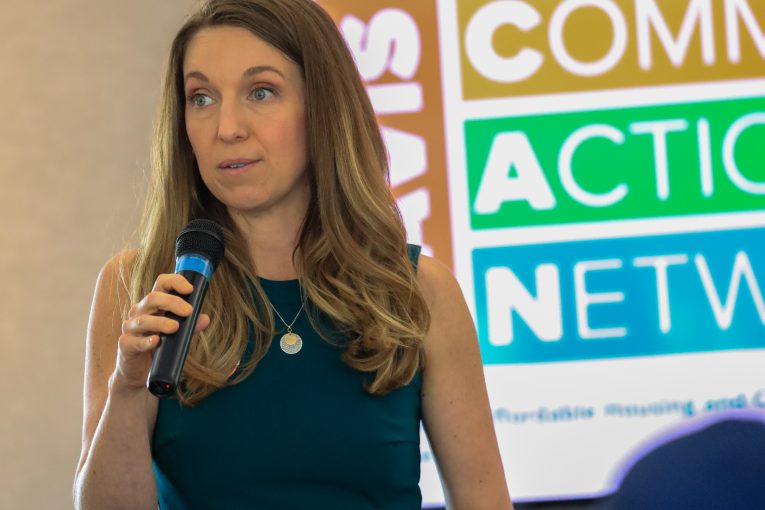
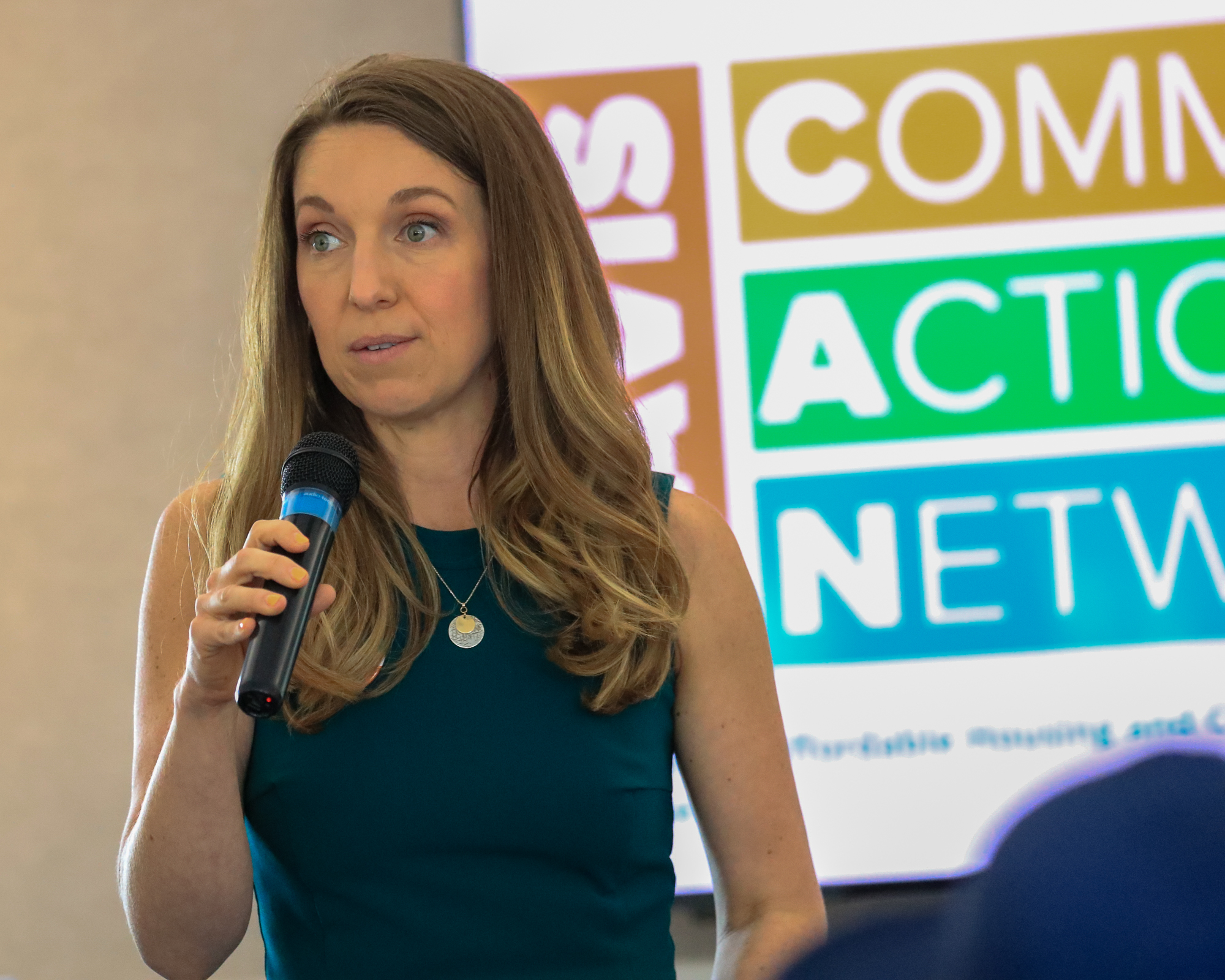
by David M. Greenwald
Executive Editor
Davis, CA – For years, we have heard the same note—over and over again—a housing project comes forward, slow growth advocates warn us about traffic, climate, and other impacts. Occasionally, student groups will come forward in an ad hoc way to push for student housing. Climate advocates will come forward to talk about climate change. Homeless advocates will come forward to talk about homelessness.
What we have not seen, at least in my 17 years of doing this, is an organized group that can mobilize community members and push for needed changes to local housing policies.
This is what we saw yesterday. Davis Community Action Network, or Davis CAN, made up of local community members. It’s not backed by or comprised of developer interests. It’s not a YIMBY group.
The event yesterday at the International House was organized by Davis CAN and its Executive Director Judy Ennis.
It features a powerhouse board made up of people the community knows: Robb Davis, the former Mayor; Carol Hillhouse, Long-time leader of UC Davis Student Farm; Jonathan London from UC Davis Center for Regional Change; Victor Lagunes, the DTA President; Dan Olmos, a local civil rights attorney; Judy Wong Chen, a local educator; and NJ Mvondo, a community activist who heads up among other things the Human Relations Commission and Yolo Climate Action Commission.
Among the Senior Advisors: Anoosh Jorjorian from Phoenix Coalition; Darryl Rutherford, a longtime affordable housing advocate; and Aaron Wedra. Core Team: Eli Sarnat, Amy Medovoy, Mark Huising, and Julia Schreiber.
Speakers yesterday included: Victor Lagunes, NJ Mvondo, Jonathan London, Catherine Brinkley and Councilmember Bapu Vaitla.
The Vanguard is going to roll out coverage in probably four parts. Today we did Bapu Vaitla, in part because he did a great job of connecting the tragic death of David Breaux to the fact that he was homeless along with our community’s failures to deal with housing insecurity and the unsheltered homeless population.
Director Judy Ennis laid out the vision of Davis CAN in a brief power point that I reproduce here.
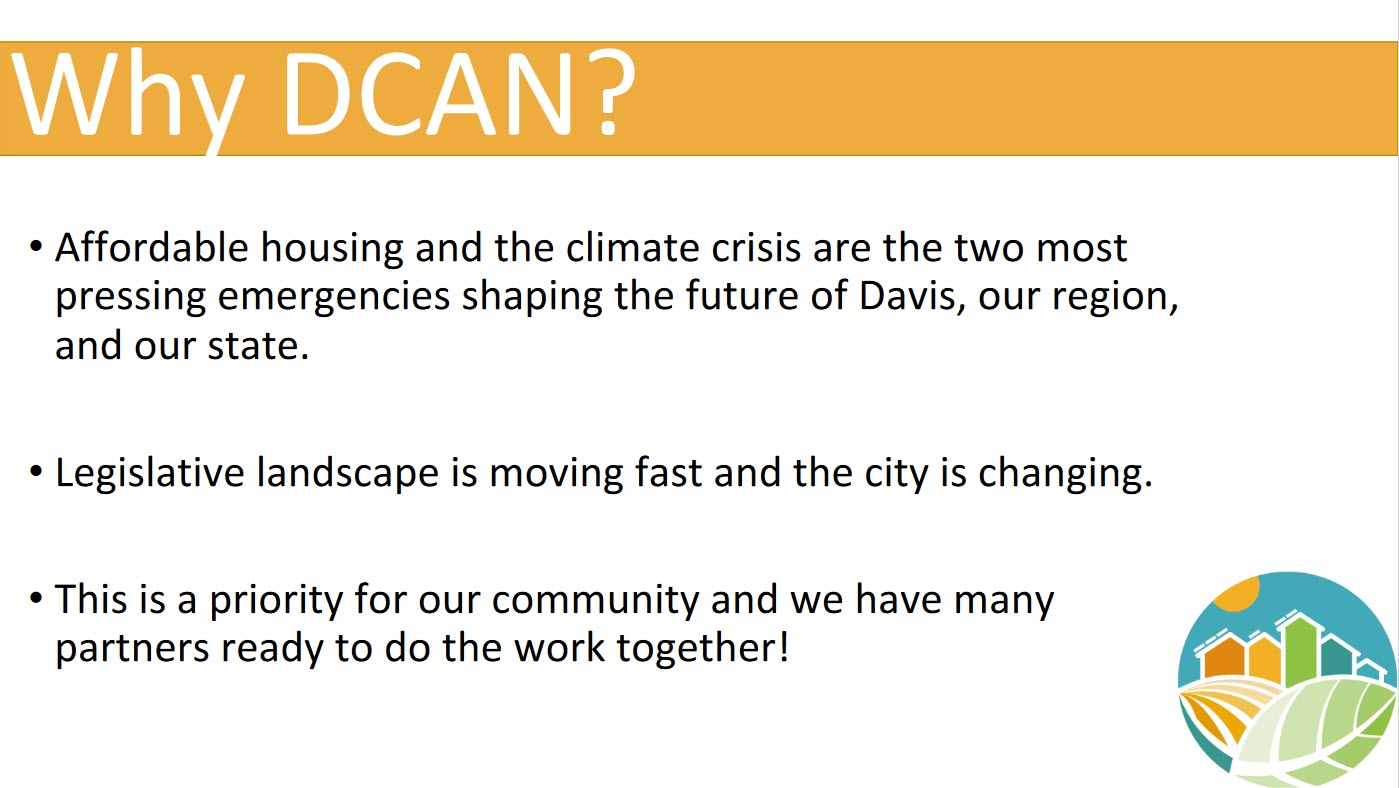
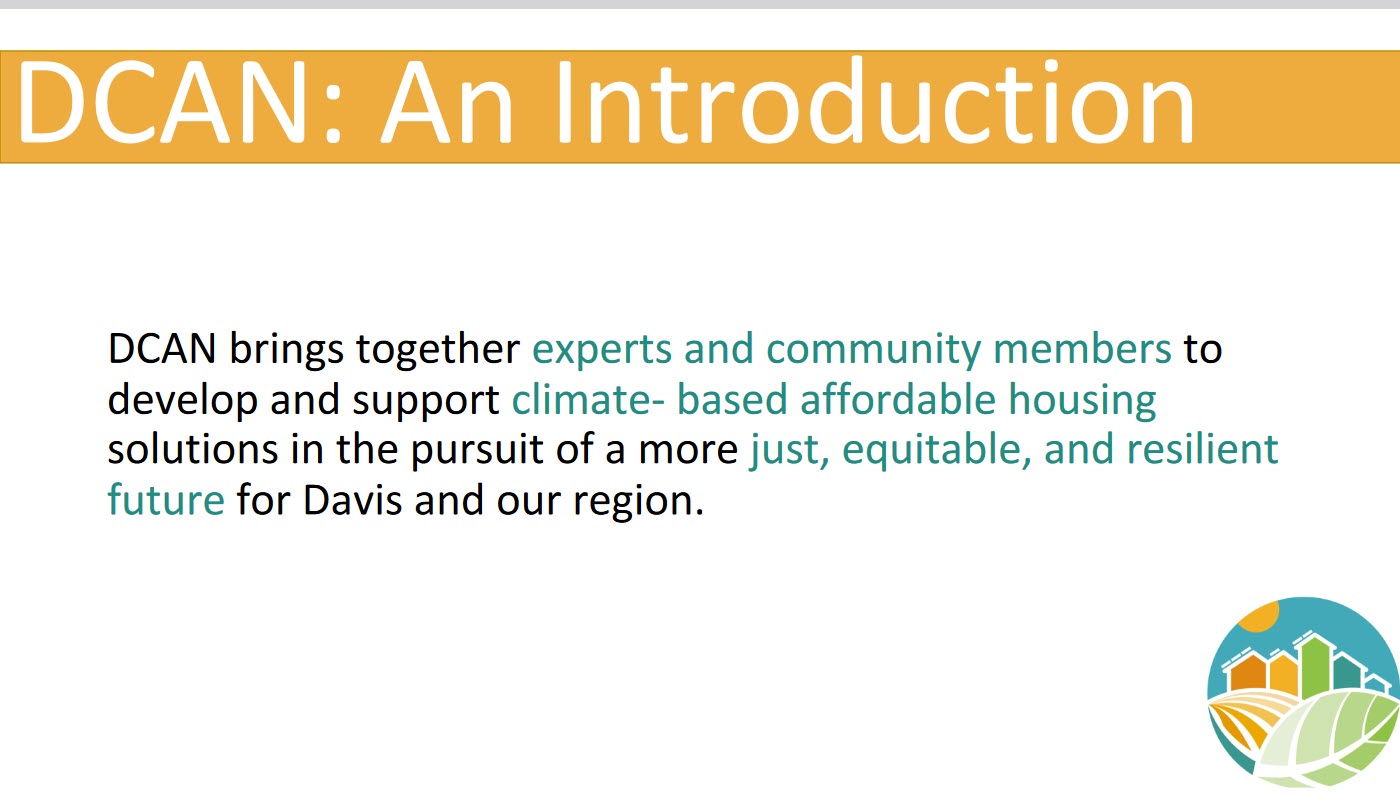
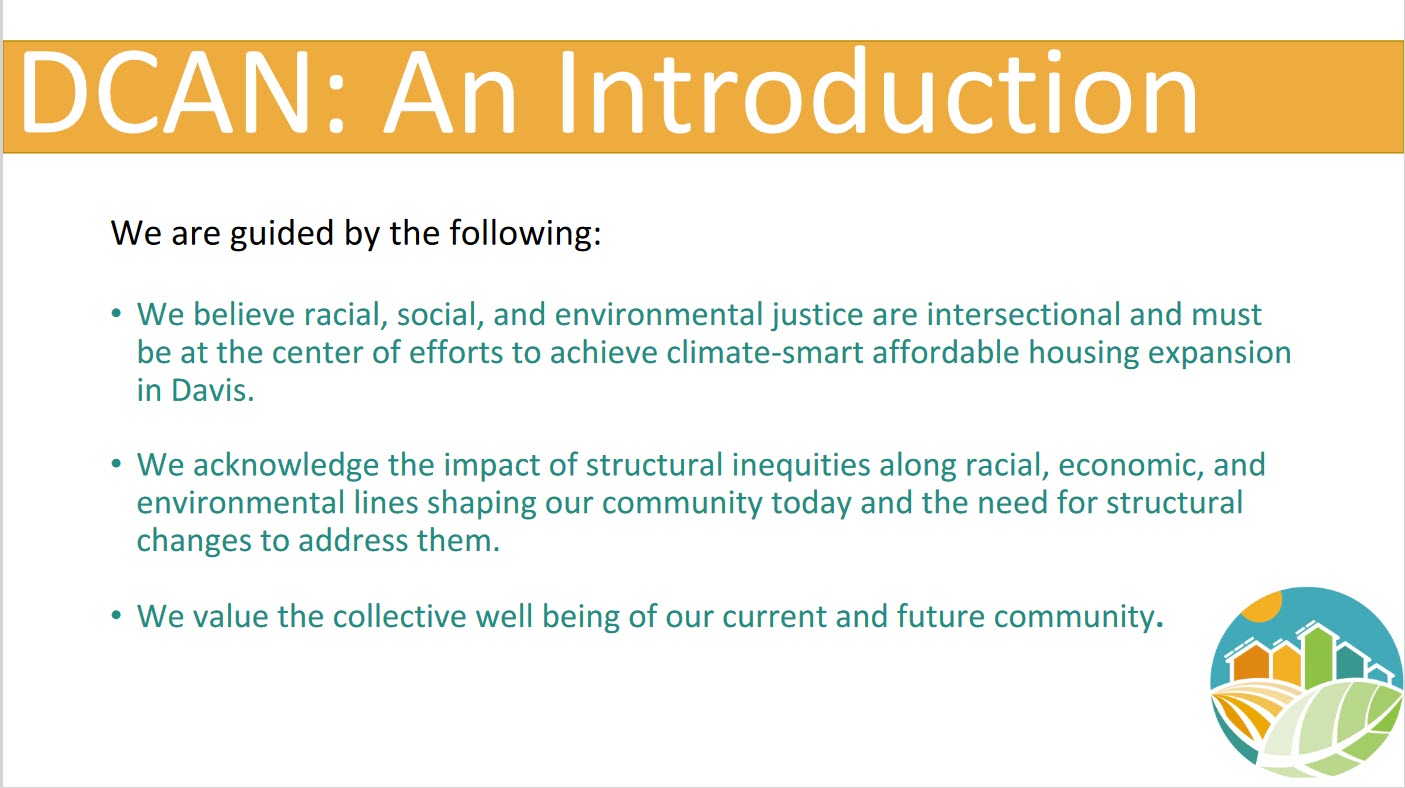
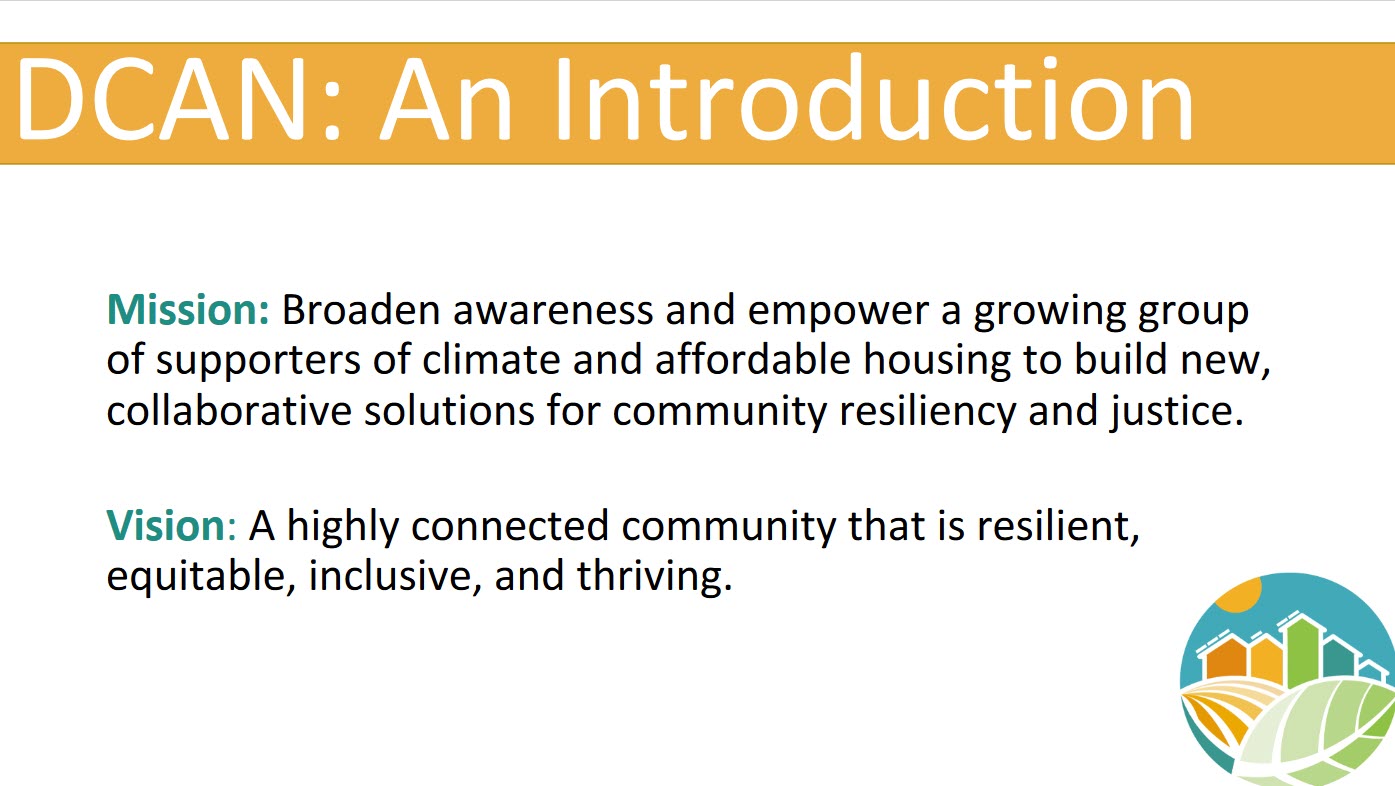
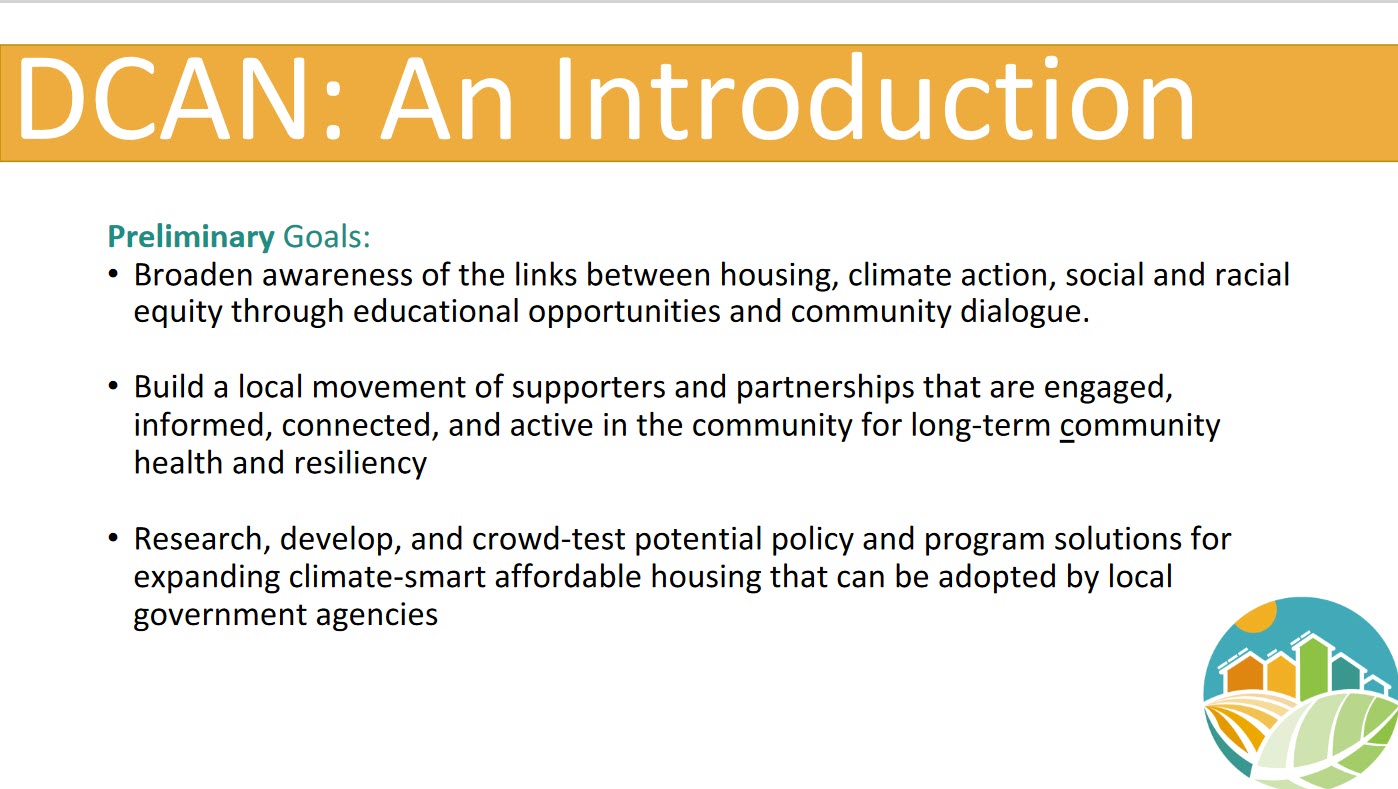 The housing crisis in Davis has the potential to change the entire landscape of local politics. We have already seen a number of groups come forward. Last fall, the Interfaith Housing Justice Davis (IHJD) brought in Leah Rothstein to have a community discussion on housing.
The housing crisis in Davis has the potential to change the entire landscape of local politics. We have already seen a number of groups come forward. Last fall, the Interfaith Housing Justice Davis (IHJD) brought in Leah Rothstein to have a community discussion on housing.
There is also Sustainable Growth Yolo.
But Davis CAN, with its strong community base, is poised to make a real change in the way these issues are viewed in Davis and has the potential to reach a lot deeper.
We’ll see what they are able to do.
On Sunday, competing with community tragedy and game seven of the Kings games, they brought out about 80 community members by one estimate. About 55 percent of those were women and about 25% under 40.
You can learn more at: https://www.daviscan.org/


I’d call that a “YIMBY” group, or at least a YIMBY-minded group.
But regardless, what is “climate-based affordable housing”? What does that even mean?
It would be interesting to get this group’s thoughts regarding DISC, the “Davis-connected buyer’s program” (at WDAAC), etc.
Was the student who was subsequently stabbed to death “homeless” as well? I don’t think so.
And if/when we find out more about the suspect, is this one of the type of people that David thinks don’t belong in prison, while also arguing against the employment of cameras in public spaces?
There is nothing wrong about being a YIMBY unless you are a die hard NIMBY. I have communicated my interest in joining this interesting organization.
It’s not backed by or comprised of developer interests. It’s not a YIMBY group.
Is the inference here that YIMBY groups are developer backed? I dont think we agree on the definition of a YIMBY.
SGY (which Im involved with) is what I would call a YIMBY group, but we are NOT backed by developers.
Davis CAN which is also pro-growth and not developer backed, I would also consider a YIMBY group, because it specifically is FOR building more housing… right?
What am I missing?
Is the inference here that YIMBY groups are developer backed? I dont think we agree on the definition of a YIMBY.
SGY (which Im involved with) is what I would call a YIMBY group, but we are NOT backed by developers.
Davis CAN which is also pro-growth and not developer backed, I would also consider a YIMBY group, because it specifically is FOR building more housing… right?
What am I missing?
I’ve asked this question before without getting any answers. How many of the current Davis homeless will get housing from all the new proposed development?
Why do you believe that that’s the question you should be asking or one that can be answered?
Really? You don’t understand the reason that question should be asked?
That’s supposedly the primary goal of this group in the first place. And ultimately, the only way to measure or achieve success is to put some numbers on it.
Otherwise, it’s just a nebulous, “feel-good” pursuit (which may not even have any relationship to the goal). Sort of like, “build, baby, build” – without any analysis of the results. (Similar to what YIMBYs do.)
In the case of YIMBYs, it often results in gentrification – pushing MORE people out, and “replacing” them with wealthier people. Which is probably the reason that they’re supported by the tech industry, among others.
Of course, now that the tech industry is laying-off so many, the tables are starting to turn back again (slowly).
And with the rise of telecommuting, their “pool” of potential workers is increasingly world-wide.
I think the tide is turning regarding work from home.
Here’s a list of major companies requiring employees to return to the office
The list includes companies like Amazon, Salesforce, Disney, and JPMorgan.
https://www.businessinsider.com/companies-making-workers-employees-return-to-office-rto-wfh-hybrid-2023-1?amp
Or maybe not.
One office building in 1 city is a tiny data point. Provide 20 such examples in multiple cities and I might believe you. There is also the phenomenon of downsizing occuring in the tech sector.
Because this article and past articles have brought it up.
Is it an answerable question?
Is the only way for housing to impact homelessness to house currently homeless people? What about on the other end, provide housing for people at risk of homelessness? Like at Creekside or Paul’s Place? What about providing stable housing that might prevent people from becoming housing insecure down the road? I think your question is overly narrow in its scope and largely unanswerable. When Mace Ranch was built, no one could have anticipated Creekside. It came more than two decades after the housing was built.
But there are people pushing building new developments in the name of needed housing for the homeless so I would think asking the question of how many Davis homeless will get housed if these projects get built is a legit question.
Generally housing for the homeless is – permanent supportive housing. Paul’s Place is one example.
But I’m not certain that’s really what they are talking about. A lot of housing needs are for vulnerable populations and can be served with the affordable housing plans that are being proposed.
I think that’s a fair question but the answe is very complicated.
The simple answer to your question is that it depends…it depends on: what type of financing was secured by the developer, were project based vouchers included in the development, or has the developer agreed to keep rents low at an affordable level based on the tenant’s income, will new housing options provide opportunities for households to move out of their current affordable housing unit that then will open up a place for someone experiencing homelessness an opportunity to be more permanently housed.
That’s why it’s important for DCAN to exist…to advocate for solutions on the front end so as projects go through the entitlement process the development will address the community’s need once built.
My concerns in no particular order:
* “… Davis and our region…”: Sure, DCAN’s got the University and its hyperlocal diaspora, and it might be easier to start and continue to do certain things within the borders of the city but… an intentional foundation in Davis is curious, as there’s no way things can truly start to be solved if this organization is primarily Davis-identified. Yes, I see a few formally regionally-focused people in the org. I suppose the more precise question is how many people from “… the region…” were present… perhaps the overall better question is how many people in attendance disagreed with each other about important issues,
* In relation to my previous point, it goes beyond e.g. sprawl in Woodland… it’s our interconnected transport system, from the 102 death corridor to the absurd comparison of the facilities, ex-facilities and immediate surroundings of (former) railway stations in both Davis and Woodland…
* Given the unhealed and still partly festering wound of DISC I and II, I think it’s fair to ask for people involved to make clear if they supported it or not.
* There are plenty of recent politicians still active in the community to speak at events like these. It’s really not necessary to have people currently in office, and perhaps a bit more problematic if that politician’s former staff during the election are part of the core team of the organization. I’m not naming names because this should be a rule, even in an organization that is trying to be a 501c4, rather than a -c3.
* It’s strongly alluded to, but I would like to see a specific mention of the General Plan update.
* Last but not least, it would be useful if someone from the organization took issue with Mr. Greenwald’s chronic “slow growther” slur!
* Bonus comment: Will DCAN encourage the City of Davis to sue Caltrans so they don’t add a lane to I-80 and/or will they encourage Caltrans to sue the City of Woodland to stop its sprawl development, which makes public transport – both local and regional – nearly impossible to sustain?
” Last but not least, it would be useful if someone from the organization took issue with Mr. Greenwald’s chronic “slow growther” slur!”
LOL. I don’t use NIMBY, and I get accused of using a slur by describing people as “Slow Growthers” Can’t win.
David wrote
Just don’t conflate like that. Don’t use labels, except for when people label themselves, or it’s obvious – like “fascist”.
I am one who
BUT I don’t think you would refer to me as a “slow growther”, right? For me the goal is not “growth” of any kind it’s degrowth.
BUT don’t call me a “degrowther”, unless I am a fascist about it!
I do too – ESPECIALLY those who cry “housing shortage”.
No, and no.
Yes – you do (regarding the use of NIMBY), and no – you don’t (regarding the use of the word “slow-growthers”.)
But who cares about labels, when you come right down to it? I’m familiar with about half of the “housing advocates” you listed, and I’d refer to them as the “usual suspects” if it was up to me. And you’re one of them.
If anything, you’re a “every single day suspect”. 🙂
But seriously, these people have to be stopped, or at least channeled where they won’t do as much damage. Especially if they’re not even talking about rent control.
By the way, why hasn’t Trackside been sold? Could it be that (even with NO affordable housing), it’s still not penciling-out? Yikes.
First of all, please provide concrete evidence that anything Mr. Greenwald has ever said on his site even rises to the level of a slur. Secondly, if David has actually ever written a “slow growther slur”, it’s likely only a slur if you are a NIMBY or in your case a degrowther. In this instance, it’s in the eyes of the beholder whether or not it’s a slur. I believe you should always call people who they really are instead of accepting their word for it. Some attempt to hide/deceive who they really are. The Moms for Liberty is an excellent example of this phenomenon.
Excuse me while I clean coffee off of my computer.
Seems like you’re getting confused, here. Todd is no “degrowther”, and I’m not sure I’d even describe him as a “slow-growther”. His comments indicate a strong support for more infill/density, and discouragement of cars.
But he is mistaken in regard to describing “slow-growther” as a slur. This was already pointed out.
“NIMBY” is a slur. The reason being that it implies hypocrisy. Again, pointed out previously as well. Though there is some reality to the description for (probably) most people, in that they don’t want a development that they view as negative “next-door” to them (in their “backyard”). But would not object as strongly if it was “elsewhere”.
Part of the reason for that is because people only have so much time and energy to fight against proposals, so they’re going to focus on the ones that would personally impact them the most.
When you come right down to it, people aren’t really all that different than any other animal. Ask any cat if they like seeing another cat venture into “their” backyard.
When people in the community want to use the answer to this question as a weapon to attempt to disqualify someone from being able to contribute to the discussion, then we should not be asking and answering that question. It’s time to move on to new solutions rather than dwelling in the past as though that is some type of important litmus test rather than being the simplistic choice in a particular moment. Every circumstance is different.
It’s a perfectly-fair question to anyone who claims to be concerned about (either) “housing shortages” and local contributions to greenhouse gasses.
“… it’s our interconnected transport system, from the 102 death corridor…”
I agree, road 102 is a horrific accident waiting to happen. Too many cars are going too fast without a barrier between the northbound and southbound traffic lanes. I wish that our Board of Supervisors does something to make that road safer.